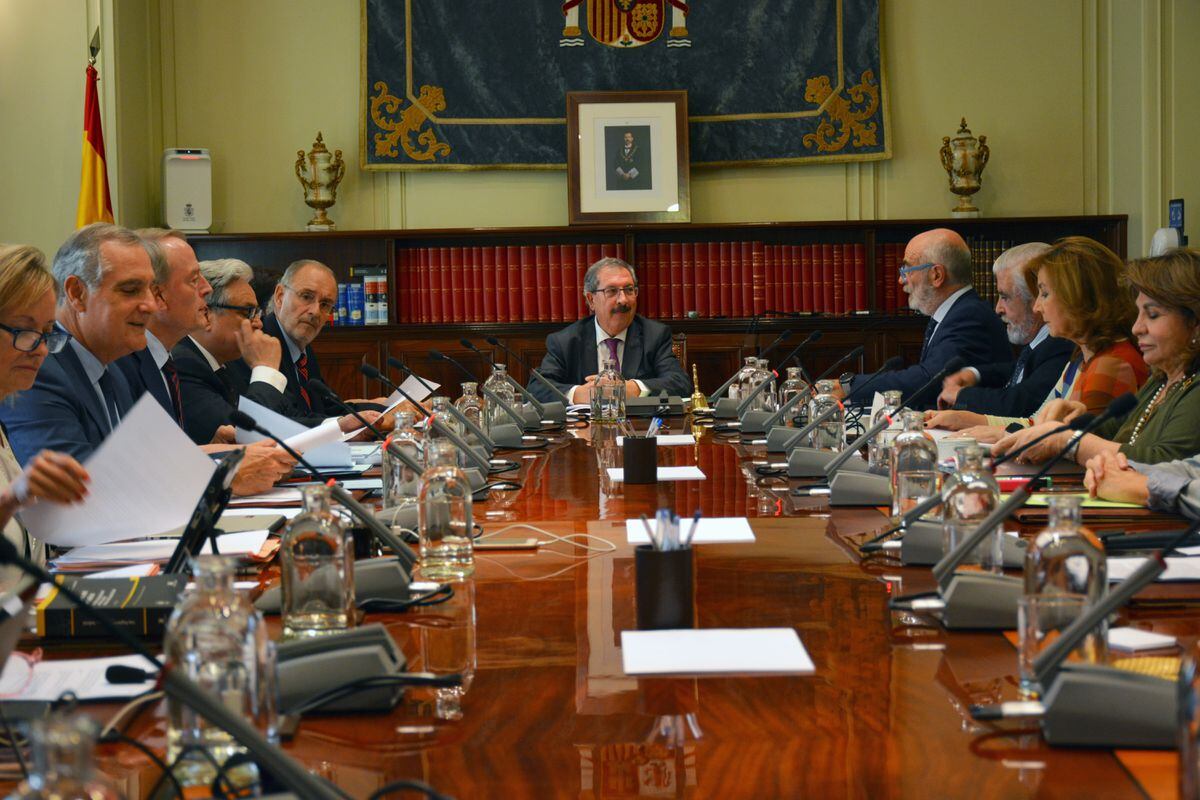Plenary session of the CGPJ chaired by Rafael Mozo, on October 13.
The limping negotiation in the General Council of the Judiciary (CGPJ) to appoint the two magistrates of the Constitutional Court that the plenary session should have chosen before September 13 has once again stalled this Wednesday.
The conservative and progressive members had met to try to advance the process, but the meeting ended without progress because the conservatives demand a "change in methodology" that the other sector rejects because it considers it an attempt to veto their candidate, the Supreme Court magistrate José Manuel Bandrés.
The novelty is that the members proposed by the PP, who since the negotiation began at the beginning of September have been raising successive excuses to block, or at least delay, the renewal of the guarantee court,
The meeting on Wednesday came with a clear path to the last reason that the conservatives had used to keep the renewal of the guarantee court on pause: doubts about the permanence of the member Rafael Mozo as substitute president of the CGPJ.
The Supreme Court rejected in the morning the request that Mozo be temporarily suspended that had been presented by the member Wenceslao Olea and the secretary of the Council when appealing his appointment, so the path to choose the Constitutional magistrates seemed clear.
But the story of the conservative members seems to be taking an unusual path so far: if in the end there is no agreement to renew the guarantee court, the fault will lie with the progressives.
"We want to negotiate, but they refuse," says a member proposed by the PP,
The change in method that the conservatives are now looking for consists of each sector putting two or three candidates on the table and both blocs negotiating to agree on the two final ones, one progressive and the other conservative.
After the meeting on Wednesday, the group of councilors proposed by the PP released a brief note to the media with their summary of the situation: “The interlocutors of the other group do not accept the methodological change that was proposed to them.
This means that they refuse to assess/negotiate different candidates so that the two that are named respond to the choice of both groups, and not merely an exchange of one name for another.
Therefore, and in summary, they do not accept any other candidate than Bandrés and do not accept a methodology that involves a real debate on the suitability of all kinds of candidates.
Both groups have agreed to see each other again next Wednesday, a meeting that may be definitive to verify if the process can be unblocked or is in real danger of definitively derailing, according to the admission of members of both blocks.
The progressives rejected this Wednesday the election formula that the other sector is now proposing and the two conservative members who participate in the commission that negotiates the appointments have agreed to inform their colleagues and communicate the response next week.
Progressive sources insist that from the beginning of the negotiations there was talk that each group would propose a candidate, and it was implied that there would be no vetoes.
The conservatives have not chosen their official candidate, but instead maintain a list with six names: Pablo Llarena,
Julián Sánchez Melgar and Vicente Magro (of the Criminal Chamber), César Tolosa, Inés Huerta and Diego Córdoba (Contentious-Administrative Chamber).
For now they have not communicated who or who are their favorites and sources in this sector suggest that they will not do so if the progressives do not agree to change the method of election so that the discussion focuses on several names.
The progressives have asked during the meeting on Wednesday if the real problem is one of methodology or if some councilors proposed by the PP do not want the appointments to go ahead.
And the response, according to members of the body, has been that both situations coexist in the group.
The conservatives do not explicitly veto Bandrés, but some members of this sector do not want to vote for him because they consider him a "government" candidate.
"We do not doubt that he meets the conditions, but it is necessary to see if he is suitable," says a member reluctant to vote for this magistrate.
Others admit that he seems like a good candidate to them, but they doubt if they will be able to convince their colleagues of him.
The pending renewal of the Constitutional consists of four magistrates: two chosen by the CGPJ and two by the Government.
The Executive is still waiting for the Council to propose their two names to proceed to designate their own, but it is not willing to keep the process stopped for much longer.
In La Moncloa they do not want to officially confirm any date, but if the president, Pedro Sánchez, wants to reach December 6, when Constitution Day is celebrated, with this matter resolved, he only has two councils of ministers left to do so: the next one, Tuesday the 29th, and Monday the 5th, where another one will most likely be called.
Asked about this question, the president, Pedro Sánchez, has assured this Wednesday that the Government is going to designate its two magistrates:
“We would not be in this situation if we did not suffer from a denialist opposition that has not fulfilled its obligations for four years.
The Government will comply with the Constitution and appoint its two magistrates”, he said.
Subscribe to continue reading
Read without limits
Keep reading
I'm already a subscriber

